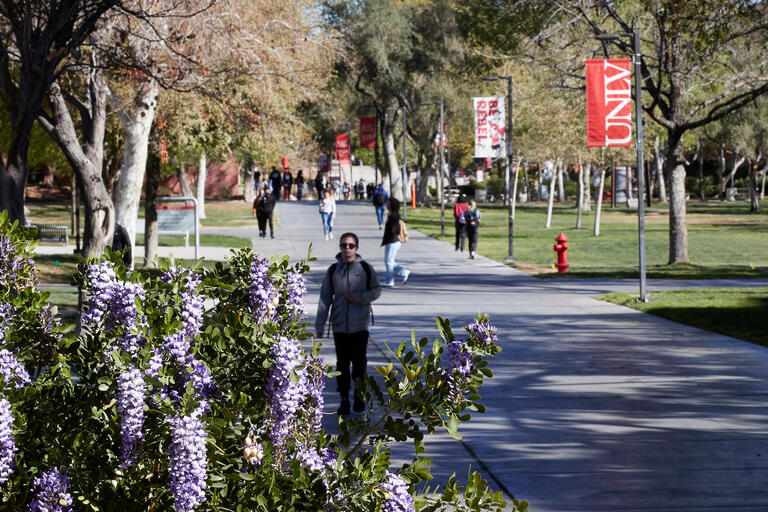Following time as a post-doctoral teaching fellow at Scotland’s University of Edinburgh, Brian Wall joined the Boyd School of Law as its director of graduate programs. At Boyd, he will provide administrative leadership to the law school’s graduate degree programs including the LL.M. in Gaming Law and Regulation and other non-J.D. programs.
Why UNLV?
Interdisciplinary work has been the core of my research, teaching, and program development for the past several years, and the Boyd School of Law’s focus on developing collaborative and innovative programs was a perfect fit. Plus, after four wonderful but perpetually freezing years in Scotland, the Las Vegas heat sounded great!
Where did you grow up?
My family moved to Henderson from Chicago when I was 5. I graduated from Green Valley High School and, after 16 years away, am delighted to be back in my hometown.
Where were you before UNLV?
I was a postgraduate teaching fellow at the University of Edinburgh, where I earned my Ph.D. Before that I earned my J.D. and served as assistant dean of admission at William & Mary Law School.
What inspired you to get into your field?
This is definitely a cliché answer, but I first seriously started entertaining switching from my literary studies into a legal career after reading Harper Lee’s To Kill a Mockingbird. The fact that it was literature that got me into law never really went away, and my legal studies kept intertwining themselves with my literary background until I ended up deciding to get a Ph.D. in transatlantic law and literature. That led to further investigation into productive relationships between law and other areas of academia, which led me to Boyd.
What’s the biggest misconception about your field?
That specialization requires segmentation and separation. I am committed to the concept that academic and professional areas actually have a great deal to say to and inform each other, and that experts in all areas — gaming law, literature, public health, etc. — can learn from and work productively with each other.
Proudest moment in your life?
Personally, marrying my wife and seeing the birth of our daughter are definitely tied for number one. Professionally, I feel a great sense of satisfaction every time I’m able to help a student achieve his or her potential. I’ve been lucky enough to receive a few awards for teaching and research, but those pale in comparison to the joy of seeing a student write a truly excellent paper on the fifth draft or be accepted to the graduate school or professional opportunity of their dreams and knowing that I had a small part to play in making that happen.
One tip for success?
It’s okay to change your mind! You might make a decision that seems perfectly right at the time, but two days or two months or two years later feels horribly, horribly wrong. That’s okay — that’s part of the information gathering process, and it is great to take what you learned from that experience and roll it forward into the next one.
What would people be surprised to know about you?
My wife and I met in a dance class at BYU. She accidentally elbowed me in the face during the cha-cha, and I asked her out shortly thereafter!
Who was your favorite professor and why?
I have had great teachers my whole life and there are a lot of people I could name here, but Cynthia Ward from William & Mary has to be at the top of the list. She helped me really make the connections between the legal and literary sides of my academic background and gave me the mentoring I needed to turn those into a viable Ph.D. proposal.
Who is your hero?
My Grandpa Carrington. In addition to being one of the kindest human beings to ever walk the earth and one of the funniest people I have ever met, after leaving the Army at the end of World War II he returned to his hometown of LeRaysville, Pennsylvania, to become a teacher.
Tell us about an object in your office that has significance for you and why.
On my office desk I have a picture of my grandfather (see previous question) grading papers in his classroom with a huge smile on his face, and it reminds me of the kind of influence I strive to have on the students I work with.



